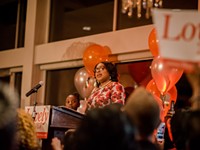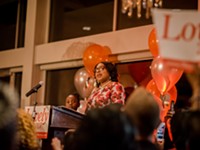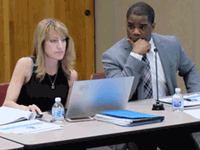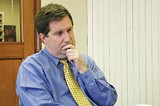[
{
"name": "500x250 Ad",
"insertPoint": "5",
"component": "15667920",
"parentWrapperClass": "",
"requiredCountToDisplay": "1"
}
]
Rick Dollinger takes over the Monroe Democratic Party at a tough time. It has the reputation of being both weak and fractious. Republicans control county government and nearly every suburban town. In the County Legislature, Republicans repeatedly ignore Democratic initiatives, sometimes even ignoring their requests for public documents. Republicans vastly outperform the Democrats in fundraising.
Dollinger's predecessor, Molly Clifford, was respected by many party activists, but under her leadership the Democrats were able to make little headway in winning local offices. And they've had a fairly high turnover rate of party chairs.
Worse, the Democrats often seem to be fighting one another more than they are the Republicans. Fights among strong personalities within the party, in fact, led Clifford to resign suddenly on January 31.
The infighting may get worse; there'll be a Democratic primary for mayor in September, and there's already open hostility among supporters of some of the candidates.
The 53-year-old Dollinger, who'll serve in the job part-time and will hire an executive director, says he had "no dying ambition" to become party chair. His law practice was doing well, he says, and he was reluctant both to take the cut in salary and to sacrifice the time at work and with his family that the job will require.
But, he says: "I honestly feel that at some point, you have to put your money and your mouth where your principles are. I can't walk around and say I believe in the Democratic Party and its message and its history, and have somebody come to me and say, 'Would you like to put that into action?' and say, 'Well, I'm kind of old and tired and really want to go into retirement.'"
"There are too many people sitting on the sidelines complaining," he says. "I'm not going to do that."
Dollinger is a familiar figure in local politics. He served in the County Legislature from 1987 to 1992, then served in the State Senate for 10 years. He lost an ugly race for County Court judge in 2002, but has stayed involved in Democratic politics.
While he may have not sought out the post, he clearly relishes the challenge. And he insists that he'll be able to keep Democrats in line throughout what will be a hard-fought primary for mayor --- and at the same time raise money and help put together a slate for the County Legislature. Every seat in the legislature will be on the ballot in November, and many long-time Democratic incumbents have reached their term limit and can't run again.
Republicans were facing the same challenge, but they've already begun moving their most senior legislators into other positions --- and appointing people to take their place. In several districts, brand-new Democratic candidates will be facing incumbents in what would have been open, perhaps more competitive races.
In a recent interview, Dollinger insisted that neither the warring nor the weakness images are entirely accurate. "There have been some personality rifts between public officials," he said, "and those have been blown up by our opponents to suggest that we're incapacitated by division. I don't believe that to be the case. I think that's more or less the gospel according to the Republicans: Keep saying Democrats are fractious, and it'll turn people away from asking the tough questions about what's going on in county government."
He'll hold the warring factions together "using the strength of my personality and the basis of my friendship," he said. "I'm not going to let sandbox sensibilities drive the mayor's race."
And as for the local party being weak: "The numbers belie that," said Dollinger. "John Kerry won here. Hillary Clinton won here. Chuck Schumer won here. We've been able to win on the national level if we have the right message."
"I would add," he said, "this is still a bellwether county. This is a county that is almost evenly split, based on voting patterns, between Democrats and Republicans."
"We have to find quality candidates and come up with a quality message that works in the suburbs," he said. He points to Westchester, Nassau, and Suffolk Counties, traditionally Republican areas that have been electing Democrats. "My intention," he said, "is to bring people from those communities here to tell us how they did it."
Another reason for Dollinger's optimism: his conviction that Eliot Spitzer, the Democratic attorney general, will be elected governor in 2006 and Democrats will again be in charge in Albany.
"The Democratic Party in Monroe County has been in an unusual posture in the last 10 years," said Dollinger. "We live in the bluest state in America, and we don't have access to the political power that comes with having a Democratic governor. That power is helpful on the local level. It assists fundraising. It assists the ability to reward people who work for the party, quality people who should be working for state government, handling state agencies."
"We've been shut out of that for 10 years, and we'll be shut out for two more years," said Dollinger. "That has made it very difficult for a succession of chairs to build the party infrastructure."
So it was a Republican governor who built the Monroe County Republican Party into a powerhouse? Many people think it was local Party Chair Steve Minarik, with his uncanny ability to raise money --- and the clout that money gives him to keep local Republicans in line.
"Where do you think he gets that power?" said Dollinger. "Steve Minarik can go into a room and say: 'You guys are all contractors for Monroe County. You all want to be contractors for the State of New York. You would like to think that at some point if you need a favor, one of us could pick up the phone and call the governor and something would happen.' Steve Minarik has had that power. He has had that at the governor's level. He's had it at the presidential level for the past four, five years. And he's had it at the local level."
Monroe County Democrats were in a similar position, said Dollinger, in the 1980s, when, at one point, Democrats controlled not only City Hall but also the County Legislature, the county executive's office, and the county clerk's office.
During the same period, Democrat Louise Slaughter defeated Republican incumbent Congressman Fred Eckert. "Why does Fred Eckert lose? Because Mario Cuomo has got power," said Dollinger. "The party is able to raise money because they have a governor who's a Democrat. The first time I got elected to the County Legislature, I got my picture taken with Mario Cuomo with a Rick Dollinger button on his lapel. I put it on the back of my last flyer; it was my last endorsement.
"Cuomo talked on behalf of Tom Frey in a television commercial: Mario Cuomo, in his own inimitable style, saying, 'Here's the guy you need to elect as county executive. Elect Tom Frey.' Cuomo was coming off of a massive re-election victory in 1986. That's how the party grew and developed."
With Pataki's defeat of Cuomo, that all changed, said Dollinger. But, he predicts, "Steve Minarik has ridden this bull as far as he can take it."
Still, it will take money for the Democrats to make inroads in suburban and rural Monroe County. The governor's race is nearly two years away; the county legislature race is this year. And Steve Minarik has a firm grip on political contributions.
"I'm going to go to people and tell them that this is a two-party town," said Dollinger. "I'm going to remind them that Democrats, national and state Democrats, have been winning here. I'm going to remind them that we're not far from the time when all of the constitutional officers of the state of New York will be Democrats, and that Steve Minarik's ability to deliver or be influential at the state level will be gone. It will be history."
Raising money will be only one of Dollinger's jobs. He must also strengthen the party and find strong candidates for suburban races. And here, the primary for mayor intersects.
That race, he said, "is really an interesting chance --- as it was in 1993 [when Bill Johnson was first elected Rochester mayor] --- for the Democrats of this community to define both the future of the party and the future course of the city. And my view is that you can't do one without the other, that they'll be linked together."
The next mayor, he said, must be committed to helping strengthen the party and form coalitions with suburban Democrats. The strength of the party may not be an issue to the average voter who values the independence of an outsider. But the party and party loyalty is important to Democratic insiders.
"The party does have value," he said, "especially in this community, because the city can not go it alone. The message of the party has to be reaching out to the suburbs and making everybody aware of the fact that the community's vitality is dependent upon the quality of life of the city."
"To be blunt," said Dollinger, "the next mayor is not going to have the resources to do that all by himself. He's going to need political power in Albany to do it. He's going to need a broader debate about how you fund communities that are struck by the scourge of concentrated poverty. And he's going to have to convert people into understanding that problem and coming to grips with it. In Albany, you're going to have to convince a Republican Senate and even some suburban members in the Assembly that the vitality of cities is important for the overall growth of the state."
Bill Johnson nearly exhausted himself taking the message of the city's importance into the suburbs --- "a tough-love message," said Dollinger --- and it cost him the county-executive seat. Democrats, said Dollinger, have to find a way to talk about the county's challenges in a way that resonates with suburban residents.
Planning, fiscal restraints, land use, open space, the cost of police and fire services, the savings offered by service consolidations: All, he said, are issues that Democrats should be talking about all the time. Democrats may not be able to get measures passed in the County Legislature, but Dollinger wants them selling their ideas "at press conferences, at School Board meetings, at VFW meetings, at neighborhood meetings, at sporting events."
"I think a bunch of the private-sector contracts, the golf courses and some other things where the county's searching for revenue, ought to be re-examined," said Dollinger. "The fact that the county's owed about $12 million by the Outdoor Sports Facilities Corporation for Frontier Field while the Rochester Red Wings have continued to make a lot of money is something that ought to be re-examined."
The Democrats' message "has to be about making tough choices about government," said Dollinger. "Do we need a communications office in the County of Monroe? Do you need to have a multiperson department that does nothing more than try to get the county executive on the evening news? I'm not convinced of that."
"I also think that there are consolidations of government that may have some value," he said. There is already talk of consolidating some suburban fire districts, he noted --- and then he veered into hotter territory: regional planning.
"I know that's a controversial issue," said Dollinger, "but I think planning is what you need: a countywide development plan for where our office parks are going to be built, where our Empire Zones are going to go. The Republican Party, which wants to encourage speculation, and the developers win if they speculate correctly --- that can be defeated by good planning. My hope is that we can convince communities that to preserve their quality of life, [countywide planning] is the best thing to do."
Buffalo and Erie County, facing major fiscal problems, are now considering consolidating. So, the Wall Street Journal noted last week, are Pittsburgh, Cleveland, and 10 other metropolitan areas. But Johnson's defeat in 2003 showed how difficult it is to sell the message in the suburbs --- and how effectively opponents can use advertising to overwhelm it.
Critics portray consolidation and regional planning as a liberal idea, and Democrats have been running away from liberalism. Not Dollinger. "I've never been afraid of the word 'liberal,'" he said. "I'm a liberal Democrat like Franklin Roosevelt and John Kennedy, Lyndon Johnson, Bill Clinton, Mario Cuomo. I believe there are things that government can do to change and improve people's lives. There's a long history of doing it in this state."
"There was a time when New York State was the progressive engine that drove America," said Dollinger. "We came with workers-compensation laws, unemployment-insurance laws. We improved the quality of life for workers. I would ask people to peel back the labels and take a good look at the programs."
Dollinger clipped off a quote from FDR's "Rendezvous with Destiny Speech," something he said is his "favorite line": "Better the occasional faults of government that lives in the spirit of charity than the consistent omissions of government frozen in the ice of indifference."
When he was named party chair last week, "I promised people that I would not be indifferent to what's going on," he said. "We will be a strong voice in the face of what goes on. And from my point of view, there's no better definition of the difference between Democrats and Republicans: the spirit of charity, trying to help people, trying to make government work for people, or the indifference that says, 'I've got mine, you've got to go get yours.'"
Are voters, particularly suburban voters in this increasingly segregated county, ready for that kind of message?
"I want Monroe County to be a test tube for the Democratic Party," said Dollinger. "If you look at the party nationally, and you look at the party locally, you could draw a relatively close parallel. There are the same kinds of issues that we face, which is that wealth is not located among the traditional Democratic base. The suburbs are generally prosperous and virtually problem free. [Democrats in] the urban core, where the upwardly mobile populations are, are looking to expand their influence and are looking for a message they can carry to the suburbs."
"If we can brew in the test tube a winning model for uniting parts of the Democratic coalition," said Dollinger, "attracting independents and convincing them there's a better way to govern, we have the possibility of sending a message nationally. That's why I take the challenge. I don't have any bones about it being easy. I don't know that I can accomplish it this year. I don't know that I can accomplish it in two years. But I do believe that this is the big fight worth having, and I believe it might as well start here."
SIDEBAR 1
Primary forecast
The Democrats' mayoral primary in September will be at least a three-way race. And that primary may be more important than the November general election. Because the vast majority of city voters are Democrats, the winner of the primary almost always wins the general election.
The race already has echoes of the 1993 race. That year Bill Johnson, the president of the Urban League, was a political outsider running against seven longtime Democratic pols. This year another outsider, Police Chief Bob Duffy, is expected to run, challenging longtime City Councilmembers Wade Norwood and Tim Mains.
Norwood and Mains, notes Democratic Party chair Richard Dollinger, have "high profiles in the party." Duffy has a high profile in the community --- higher than Norwood and Mains --- but he's not as well known, on a personal basis, within the party. He has not, for example, come up through party ranks, working on campaigns or running for office.
Norwood, who has had his eye on the mayor's office for years, has support among many Democratic elected officials. His campaign co-chairs are David Gantt and Joe Morelle, state Assemblymembers who are often at odds with one another. Norwood is expected to get the party's designation at its convention in May, but Mains has already said he'll run in a primary, and Duffy is expected to do the same.
That will set off what's certain to be an intensive, and exceptionally interesting, campaign. The key Democratic voters are what are called "Prime Dems," those who vote in nearly every primary. Dollinger estimates that there are about 17,500 Prime Dems in the city. "If you can identify 8,000 votes," says Dollinger, "you win."
But other factors may be at play this year. First, it's likely to be a high-profile campaign, which in itself may draw a high turnout. Second, Norwood, an African American who is popular in the black community, may attract voters who don't ordinarily vote in primaries. In addition, there are many new Democrats --- particularly African Americans and Dean supporters --- who registered prior to last year's presidential election.
"It's going to be good, old-fashioned politics," Dollinger says of the campaign. "It's going to be telephone calls, mail, direct contact, pitching issues. The person who wins the race will be doing this on a very retail basis."
SIDEBAR 2
Hillary? No
It may be too early for them to have much meaning, but polls are already calling Senator Hillary Clinton the front-runner for the Democrats' presidential nomination three years from now. As a local chairperson in Clinton's state, Richard Dollinger's opinion will matter. And right now, he's not enthusiastic.
In the last year's Democratic primary season, Dollinger supported North Carolina Senator John Edwards. "I honestly believed that electing a senator from Massachusetts was impossible," he says.
Then is electing a senator from New York impossible four years from now?
"I believe that given the current contours of the country," he says, "the answer to that question is yes. I think it's very, very difficult to do."
And, he says, things aren't likely to change much between now and then --- "not unless the Democratic Party starts talking about economic opportunity and upward mobility."
"If Hillary Clinton wants to run for president," says Dollinger, "she's entitled to do that. My personal opinion is that the Democratic Party needs to reach out beyond the confines of New York and Massachusetts. I would strongly suggest that a John Edwards, an Evan Bayh [senator from Indiana] --- no one else jumps off the page right now --- but I think there's space for a new Democrat and new ideas."
Speaking of Rick Dollinger, Monroe Democratic Party
-

Democrats line up to succeed Louise Slaughter
Apr 4, 2018 -

After a resounding win, it's Warren's party
Sep 20, 2017 -

Lovely Warren's next challenge: uniting the Monroe Democratic Party
Sep 19, 2017 - More »
Latest in News
More by Mary Anna Towler
-

Police reform: advocates on what should come next
Oct 22, 2019 -

Court clears the way for Police Accountability referendum
Oct 17, 2019 -

Dade outlines initial actions on district deficit
Oct 9, 2019 - More »






